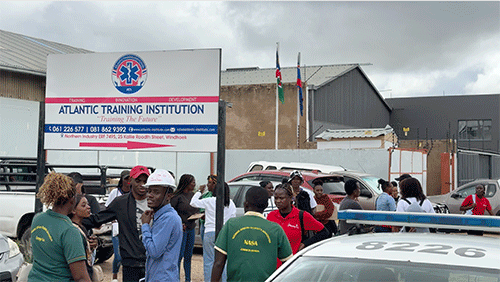Over 80 students from Atlantic Training Institute (ATI) have protested what they claim is an unaccredited and misleading auxiliary nursing programme offered by the private institution.
The protest, supported by the National African Students’ Association (NASA), highlights concerns about the programme’s non-recognition by the Namibia Qualifications Authority (NQA) and the Health Professions Council of Namibia.
The students enrolled in the auxiliary nursing course in 2023, believing it would serve as a bridging programme to an enrolled nursing qualification. However, after completing the course, many were allegedly told they could not continue to the next level of training due to the programme’s lack of accreditation. Some students have paid over N$23 000 for the course, only to find that it does not meet the requirements for further nursing education or professional recognition.
One affected student, Veronesia Namene, shared her frustration. After paying the required fees for the auxiliary nursing course and completing her modules, Namene discovered she was still not accepted into the enrolled nursing programme. She also expressed concerns about the lack of communication and transparency from the institution. “We were promised a stepping stone into enrolled nursing, but now we’re left with nothing,” she said. “The certificate we earned is not recognised anywhere, and we don’t know where to turn.”
Other students reported similar issues, including missing study materials, unfulfilled promises of refunds and repeated course modules that were allegedly already passed. The lack of clarity surrounding the status of the programme has left many feeling misled and abandoned.
In response, the students have submitted a petition to ATI’s management, demanding a full refund of their tuition fees or at least 80% and a formal apology.
They also want the suspension of the programme until full accreditation is achieved. They call for the institute to provide written evidence of any attempts to secure recognition for the programme from the relevant authorities.
Isak Matthews, the regional chairperson of NASA in the Khomas region, condemned the institution’s handling of the situation, accusing it of administrative malpractice and misleading students. “We have engaged with the institution multiple times, but they have failed to provide any concrete solutions or clear communication,” he said. “These students have been exploited financially, emotionally, and academically.”
Meanwhile, Tuneeko Nelvin Mureko, a co-founder and director of ATI, defended the institution, saying the issue lies with the Health Professions Council of Namibia, which recently decided to no longer recognise the auxiliary nursing qualification. Mureko argued that students should be allowed to complete their studies, as the auxiliary nursing programme was intended as a foundation for enrolled nursing. He stated that the school is willing to issue refunds if the programme is fully discontinued but hopes to resolve the issue with the council first.
“The problem is with the council, not with our institution. We’ve been providing study materials, and engaging with students. Our goal is to find a solution that allows them to continue their education in enrolled nursing,” Mureko said. -isipunga@nepc. com.na



